Albert II of Belgium
Albert II[1] (born 6 June 1934) was King of the Belgians from 1993 to 2013.
| Albert II | |
|---|---|
 King Albert II in 2010 | |
| King of the Belgians | |
| Reign | 9 August 1993 – 21 July 2013 |
| Predecessor | Baudouin |
| Successor | Philippe |
| Prime ministers | |
| Born | 6 June 1934 Stuyvenberg Castle, Laeken, Brussels, Belgium |
| Spouse | |
| Issue Detail | |
| House | Belgium |
| Father | King Leopold III of Belgium |
| Mother | Astrid of Sweden |
| Religion | Roman Catholicism |
| Signature | |
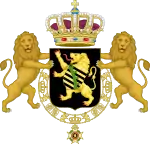 |
|
|
King Albert II is the last living child of King Leopold III and Queen Astrid, born princess of Sweden. He is the younger brother of Grand Duchess Joséphine-Charlotte of Luxembourg and King Baudouin, whom he succeeded upon Baudouin's death in 1993. He married Donna Paola Ruffo di Calabria (now Queen Paola), with whom he had three children. Albert's eldest son, Philippe, is the current King of the Belgians.
On 3 July 2013, King Albert II attended a midday session of the Belgian cabinet. He then announced that, on 21 July, Belgian National Day, he would abdicate the throne for health reasons. He was succeeded by his son Philippe on 21 July 2013. Albert II was the fourth monarch to abdicate in 2013, following Pope Benedict XVI, Queen Beatrix of the Netherlands, and Emir Hamad bin Khalifa of Qatar.[2] In so doing, he was also the second Belgian monarch to abdicate, following his father Leopold III who abdicated in 1951, albeit under very different circumstances.
Early life
Prince Albert was born in Stuyvenberg Castle, Brussels, as the second son and youngest child of King Leopold III and his first wife, Princess Astrid of Sweden. He was second in line to the throne at birth, and was given the title Prince of Liège. Queen Astrid died in a car accident on 29 August 1935, in which King Leopold was lightly injured but survived, when Prince Albert was one year old. The King remarried to Mary Lilian Baels in 1941, an unpopular union that produced three more children: Prince Alexandre, Princess Marie-Christine and Princess Marie-Esméralda.
During World War II, on 10 May 1940, at the time when Belgium was being invaded, Prince Albert, his elder sister Princess Joséphine-Charlotte and his elder brother Prince Baudouin, left the country for France and later Spain. The Prince and the Princess returned to Belgium on 2 August 1940. They continued their studies until 1944, either at Laeken, or at the Castle of Ciergnon in the Ardennes. In June 1944, at the time of the Allied landings, King Leopold, his wife Princess Lilian and the royal children were deported by the Germans to Hirschstein, Germany, and later to Strobl, Austria, where they were liberated by the American Army on 7 May 1945. Owing to the political situation in Belgium, King Leopold and his family moved to the villa "Le Reposoir" in Pregny, Switzerland, when they left Austria in October 1945 and stayed until July 1950. During that time, Prince Albert would continue his education in a secondary school in Geneva. King Leopold III, accompanied by Prince Baudouin and Prince Albert, returned to Belgium on 22 July 1950.[3]
Marriage and family
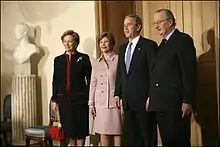
In 1958, Albert went to the Vatican to witness the coronation of Pope John XXIII. At a reception at the Belgian Embassy, he met Italian Donna Paola Ruffo di Calabria. Prince Albert proposed marriage to her, to which she accepted. Two months after their meeting, the prince introduced his future wife to his family, and four months later to the press. The couple married on 2 July 1959 and have three children, two sons and a daughter, twelve grandchildren and two great-grandchildren. Their children are:
- King Philippe (born 15 April 1960 at Belvédère Castle)
- Princess Astrid (born 5 June 1962 at Belvédère Castle)
- Prince Laurent (born 19 October 1963 at Belvédère Castle)
Delphine Boël
In 1997, the Belgian weekly magazine 't Scheldt reported that the Belgian sculptor Delphine Boël (born in 1968) was King Albert II's extramarital daughter.[4] It took some years for the Belgian mainstream media to echo this news. According to Baroness Sybille de Selys Longchamps, the mother of Delphine, she and Albert shared an 18-year-long relationship[5] into which Delphine was born. In June 2013, Boël summoned the then King, the then Duke of Brabant and the Archduchess of Austria-Este to appear in court. She hoped to use DNA tests to prove that she is the King's daughter. As the King enjoyed complete immunity under the law, Boël decided to summon his elder children as well.[6][7] After the King's abdication, she abandoned her first suit to introduce a second one only against the King as he was no longer protected by immunity and the first claim would have been judged according to the situation at the time of the introduction of the claim.[8] In March 2017, the Court ruled that her claim was unfounded, and her lawyers said she would take the claim to appeal.[9] On 25 October 2018, the Court of Appeal decided that Delphine Boël is not a descendant of Jacques Boël, and ordered King Albert to undergo DNA testing. His lawyer announced that he would seek further advice about a possible referral to Belgium's Cour de Cassation / Hof van Cassatie.[10] In 2019, the King's lawyer confirmed he would not provide a DNA sample in the case.[11]
On 29 May 2019, it was reported by CNN that Albert II had submitted a DNA sample after a Belgian court ruled on 16 May that he would be fined 5,000 euros for each day that he failed to do so, although he would continue to challenge the ruling, according to his attorney, Alain Berenboom.[12][13]
The results of these DNA samples were released on 27 January 2020 by Alain Berenboom, confirming Delphine Boël as Albert II's daughter. Albert II confirmed this on 27 January 2020 in a press release.[14]
"The king will treat all his children as equal," Berenboom said, according to VTM News. "King Albert now has four children."[15][16]
While it was proven that Boël was his biological daughter, her legal status as a daughter was not recognized[17][18] until a 1 October 2020 ruling of the Brussels Court of Appeal, which also recognized Boël as a princess of Belgium and granted her the new surname of Saxe-Coburg.[19]
Official role
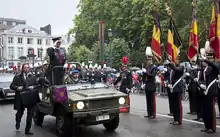
As the younger brother of the childless King Baudouin, Prince Albert was the heir-presumptive to the throne. Albert's son Philippe was groomed to eventually succeed. On Baudouin's death, Albert was sworn in before parliament, on 9 August 1993, as King of the Belgians.[20]
As King, Albert's duties included representing Belgium at home and abroad on state visits, trade missions, and at high level international meetings as well as taking an interest in Belgian society, culture and enterprise.[21]
In 1984, he set up the Prince Albert Foundation, to promote expertise in foreign trade.[22]
The King had a constitutional role which came into play in 2010–2011 when Belgium's parliament was unable to agree on a government. When the crisis was resolved, Albert swore in the new government.[23]
Albert sparked controversy in his December 2012 Christmas speech by comparing modern "populist movements" with those of the 1930s. This was seen by several political commentators, as well as many Flemish politicians, as aimed implicitly at the large Flemish nationalist party, the N-VA.[24] Bart De Wever, the party's leader, called for the King's role in the formation of Belgian governments to be changed in the wake of this comment since he "could no longer see the monarch as playing the constitutional role of referee."[24]
Abdication
On 3 July 2013, 79-year-old King Albert II attended a midday session of the Belgian cabinet, where he revealed his intention to abdicate to Prime Minister Elio Di Rupo and to the deputy prime ministers. According to a letter sent by the King to the Prime Minister and dated 3 July 2013, and which was made public, the King had already broached the topic of his intention to abdicate several times with the Prime Minister, who had asked him to reconsider it.[25] At 6 PM (CET) the King announced in a recorded radio and television speech that on 21 July, Belgium's National Day, he would abdicate the throne for health reasons. He was succeeded by his elder son, Philippe.[2]
After his abdication on 21 July 2013 it was decided that he would be styled as His Majesty King Albert II,[26] the same form of address granted to his father, Leopold III, after his abdication.
Honours
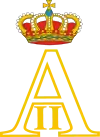
.svg.png.webp)
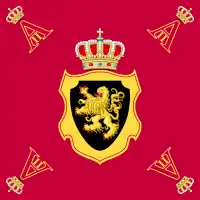
Belgian
 Grand Cordon and Former Grand Master (1993–2013) of the Order of Leopold
Grand Cordon and Former Grand Master (1993–2013) of the Order of Leopold Former Grand Master (1993–2013) of the Order of Leopold II
Former Grand Master (1993–2013) of the Order of Leopold II Former Grand Master (1993–2013) of the Order of the African Star (dormant order)
Former Grand Master (1993–2013) of the Order of the African Star (dormant order) Former Grand Master (1993–2013) of the Royal Order of the Lion (dormant order)
Former Grand Master (1993–2013) of the Royal Order of the Lion (dormant order) Former Grand Master (1993–2013) of the Order of the Crown
Former Grand Master (1993–2013) of the Order of the Crown
Foreign
 Argentina: Grand Cross with Collar of the Order of the Liberator General San Martín[27]
Argentina: Grand Cross with Collar of the Order of the Liberator General San Martín[27] Austria: Grand Star of the Decoration of Honour for Services to the Republic of Austria (1958)[28]
Austria: Grand Star of the Decoration of Honour for Services to the Republic of Austria (1958)[28] Bulgaria: Grand Cross of the Order of the Balkan Mountains (2003)[29]
Bulgaria: Grand Cross of the Order of the Balkan Mountains (2003)[29]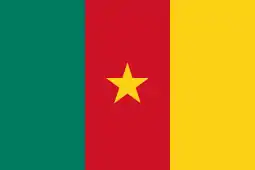 Cameroon: Grand Cross of the Order of Merit[27]
Cameroon: Grand Cross of the Order of Merit[27] Colombia: Grand Cross of the Order of Boyaca[27]
Colombia: Grand Cross of the Order of Boyaca[27]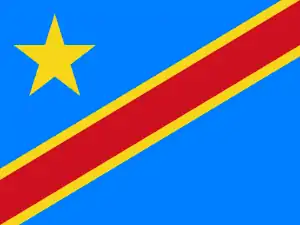 Democratic Republic of Congo: Grand Cross of the National Order of the Leopard
Democratic Republic of Congo: Grand Cross of the National Order of the Leopard Denmark: Knight of the Order of the Elephant (18 June 1968)
Denmark: Knight of the Order of the Elephant (18 June 1968)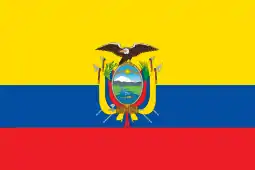 Ecuador: Grand Collar of the National Order of San Lorenzo[27]
Ecuador: Grand Collar of the National Order of San Lorenzo[27] Estonia: Grand Cross with Collar of the Order of the Cross of Terra Mariana (5 June 2008)[30]
Estonia: Grand Cross with Collar of the Order of the Cross of Terra Mariana (5 June 2008)[30] Finland: Grand Cross with Collar of the Order of the White Rose (1996)[31]
Finland: Grand Cross with Collar of the Order of the White Rose (1996)[31] France: Grand Cross of the Order of the Legion of Honour
France: Grand Cross of the Order of the Legion of Honour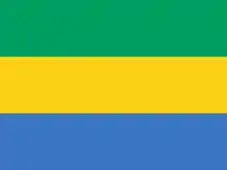 Gabon: Grand Cross of the Order of Merit[27]
Gabon: Grand Cross of the Order of Merit[27] Germany: Grand Cross Special Class of the Order of Merit of the Federal Republic of Germany
Germany: Grand Cross Special Class of the Order of Merit of the Federal Republic of Germany Greece: Grand Cross of the Order of the Redeemer
Greece: Grand Cross of the Order of the Redeemer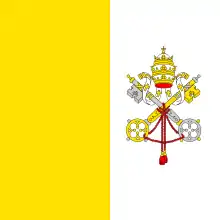 Vatican:
Vatican:
- Knight Grand Cross with Collar of the Order of the Holy Sepulchre
- Knight Grand Cross with the Collar of the Order of Pope Pius IX[27]
 Hungary: Grand Cross with Chain of the Order of Merit of the Republic of Hungary (2002)
Hungary: Grand Cross with Chain of the Order of Merit of the Republic of Hungary (2002) Iceland: Grand Cross of the Order of the Falcon (16 October 1979)[32]
Iceland: Grand Cross of the Order of the Falcon (16 October 1979)[32] Italy: Knight Grand Cross with Collar of the Order of Merit of the Italian Republic (Grand Cross 29 October 1973, Collar 19 May 1998)[33][34]
Italy: Knight Grand Cross with Collar of the Order of Merit of the Italian Republic (Grand Cross 29 October 1973, Collar 19 May 1998)[33][34] Japan: Knight Grand Cordon with Collar of the Order of the Chrysanthemum (22 October 1996)
Japan: Knight Grand Cordon with Collar of the Order of the Chrysanthemum (22 October 1996) Latvia: Grand Cross with Chain of the Order of the Three Stars
Latvia: Grand Cross with Chain of the Order of the Three Stars Lithuania: Grand Cross with Collar of the Order of Vytautas the Great (16 March 2006)[35]
Lithuania: Grand Cross with Collar of the Order of Vytautas the Great (16 March 2006)[35] Luxembourg: Knight of the Order of the Gold Lion of the House of Nassau
Luxembourg: Knight of the Order of the Gold Lion of the House of Nassau Malaysia: Honorary Grand Commander of the Most Esteemed Order of the Defender of the Realm[27][36]
Malaysia: Honorary Grand Commander of the Most Esteemed Order of the Defender of the Realm[27][36] Mexico: Collar of the Order of the Aztec Eagle[37]
Mexico: Collar of the Order of the Aztec Eagle[37]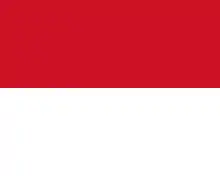 Monaco: Knight Grand Cross of the Order of Saint Charles
Monaco: Knight Grand Cross of the Order of Saint Charles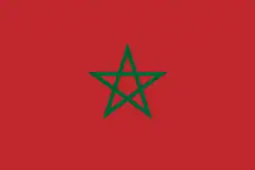 Morocco: Member Special Class of the Order of Muhammad
Morocco: Member Special Class of the Order of Muhammad Netherlands:
Netherlands:
- Knight Grand Cross of the Order of the Netherlands Lion
- Recipient of the Wedding Medal of Princess Beatrix of the Netherlands and Claus Van Amsberg
 Norway: Grand Cross with Collar of the Order of St. Olav (1964)
Norway: Grand Cross with Collar of the Order of St. Olav (1964) Peru: Grand Cross of the Order of the Sun of Peru, Special Class[27]
Peru: Grand Cross of the Order of the Sun of Peru, Special Class[27] Poland:
Poland:
- Grand Cross of the Order of the White Eagle (10 May 1999)
- Grand Cross of the Order of Merit of the Republic of Poland[27]
 Portugal:
Portugal:
- Grand Cross of the Military Order of Aviz (11 December 1985)[38]
- Grand Collar of the Order of Prince Henry (13 December 1999)[38]
 Romania: Collar of the Order of the Star of Romania (2009)[39]
Romania: Collar of the Order of the Star of Romania (2009)[39]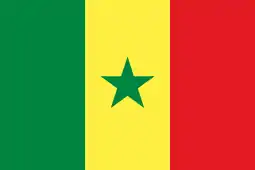 Senegal: Grand Cross of the Order of Merit[27]
Senegal: Grand Cross of the Order of Merit[27] South Korea: Grand Cross of the Order of Diplomatic Service Merit[27]
South Korea: Grand Cross of the Order of Diplomatic Service Merit[27].svg.png.webp) Sovereign Military Order of Malta: Knight Grand Cross of Justice of the Sovereign Military Order of Malta
Sovereign Military Order of Malta: Knight Grand Cross of Justice of the Sovereign Military Order of Malta Spain:
Spain:
- Knight of the Order of the Golden Fleece (16 September 199)[40]
- Knight Grand Cross of the Royal and Distinguished Spanish Order of Charles III (15 November 1977)[41]
 Sweden:
Sweden:
- Knight of the Royal Order of the Seraphim
- Recipient of the 50th Birthday Medal of King Carl XVI Gustaf (30 April 1996
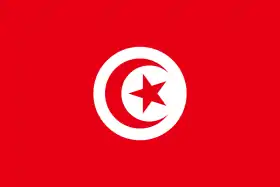 Tunisia: Grand Cross of the Order of the Republic[27]
Tunisia: Grand Cross of the Order of the Republic[27] United Kingdom:
United Kingdom:
- Honorary Knight Grand Cross of the Royal Victorian Order
- Recipient of Queen Elizabeth II Coronation Medal (2 June 1953)
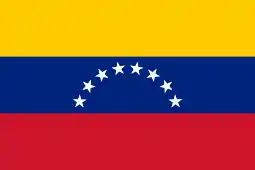 Venezuela: Grand Cross with Collar of the Order of the Liberator[37]
Venezuela: Grand Cross with Collar of the Order of the Liberator[37]
Dynastic honours
.svg.png.webp) Austrian Imperial and Royal Family: Knight of the Order of the Golden Fleece
Austrian Imperial and Royal Family: Knight of the Order of the Golden Fleece.svg.png.webp) Ethiopian Imperial Family: Grand Cordon with Collar of the Imperial Order of the Queen of Sheba[27]
Ethiopian Imperial Family: Grand Cordon with Collar of the Imperial Order of the Queen of Sheba[27].svg.png.webp) Iranian Imperial Family: Grand Cordon of the Order of Pahlavi
Iranian Imperial Family: Grand Cordon of the Order of Pahlavi
Honorary degrees
King Albert II is Doctor Honoris Causa of:
Eponym
- King Albert II boulevard, Brussels.
- Institute King Albert II, University hospital of Saint-Luc.[42]
Arms
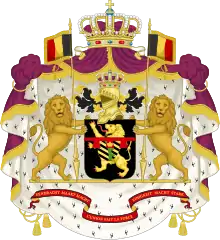 |
|
Ancestry
| Ancestors of Albert II of Belgium |
|---|
See also
- Line of succession to the Belgian throne
- Crown Council of Belgium
- Royal Trust
- Prince Albert Fund
- Michel Didisheim, former private secretary
- Jacques van Ypersele de Strihou, former chief of the Kings Cabinet.
- Frank De Coninck, (former) Marshal of the Royal Household
Notes
References
- French: Albert Félix Humbert Théodore Christian Eugène Marie, pronounced [albɛʁ feliks œ̃bɛʁ teodɔʁ kʁistjɑ̃ øʒɛn maʁi]; Dutch: Albert Felix Humbert Theodoor Christiaan Eugène Marie, pronounced [ˈɑlbərt ˈfeːlɪks ˈɦɵmbərt teːjoːˈdoːr ˈkrɪstijaːn øːˈʒɛːn maːˈriː]; German: Albrecht Felix Humbert Theodor Christian Eugen Maria, pronounced [ˈʔalbʁɛkt ˈfeːlɪks ˈhʊmbɛʁt ˈteːodoːɐ̯ ˈkʁɪsti̯an ˈʔɔʏɡn̩ maˈʁiːaː]
- Matthew Price (3 July 2013). "Belgium's King Albert II announces abdication". BBC News.
- "King Albert II". The Belgian Monarchy. Archived from the original on 25 April 2010. Retrieved 28 April 2010.
- "'tScheldt bracht als eerste het nieuws over Delphine Boël, de buitenechtelijke dochter van koning Albert". 't Scheldt (in Dutch). 17 May 2019. Retrieved 28 January 2020.
- Higgins, Andrew (19 July 2013). "Belgium Is Also Awaiting Possible News of a New Royal". The New York Times. ISSN 0362-4331. Retrieved 27 January 2020.
- Stroobants, Jean-Pierre (17 June 2013). "En Belgique, la fille adultérine d'Albert II exige une reconnaissance officielle". Le Monde. Retrieved 23 June 2013.
- Bacchi, Umberto (18 June 2013). "Belgium: King Albert's 'Disowned Natural Daughter' Delphine Boel Seeks Recognition in Court". International Business Times. Retrieved 23 June 2013.
- Le Vif, "Chacun sait que le roi Albert est le père biologique de Delphine Boël"
- mtm (28 March 2017). "Delphine Boël vangt bot bij rechter: koning Albert II is niet haar wettelijke vader". Het Nieuwsblad. Retrieved 3 August 2017.
- "Advocaat Paleis: 'Niet zeker of koning Albert DNA-test zal ondergaan'". De Standaard, datem 5 November 2018.
- "Belgian ex-king Albert II refuses DNA test in love-child case". BBC News. February 2019.
- Former Belgian king submits DNA sample in paternity case
- Analysis of King Albert’s DNA may be used as evidence in Delphine Boël paternity case
- "DNA test confirms: King Albert is the biological father of Delphine Boël". vrt.be. vrtnws. 27 January 2020.
- DNA test forces former Belgian king to admit fathering a child in extramarital affair
- Former Belgian King Albert II admits he fathered love child over 50 years ago
- Nu Delphine Boël wel degelijk de dochter van koning Albert II is: wordt ze prinses? En deelt ze in de erfenis? Article in Dutch
- but Albert stated he will not raise any objections about his legal paternity. A court will decide about this matter in the near future.Ex-King of Belgium Acknowledges a Long-Dismissed Daughter
- | Boffey, Daniel "Delphine Boel, Belgian king's daughter wins right to call herself princess" The Guardian (1 October 2020)
- "The Belgian Monarchy: Home – Royal Family – King Albert II". The Belgian Monarchy.
- "The Belgian Monarchy: Home – The Monarchy today". The Belgian Monarchy.
- "The Belgian Monarchy: Home – The Monarchy today – Royal Initiatives – Prince Albert Fund". The Belgian Monarchy.
- "Belgium swears in new government headed by Elio Di Rupo". BBC News. 6 December 2011.
- "Belgium King Albert II Christmas speech sparks controversy". BBC News Online. 27 December 2012. Retrieved 2 January 2013.
- "Letter of King Albert II to Prime Minister Di Rupo announcing his intention to abdicate". Scribd.com.
- "Koning der Belgen versus Koning (Dutch)". Deredactie.be.
- Carnet Mondain, [Carnet Mondain, p. 2 ed. 2005] book page with Alberts honours
- "Reply to a parliamentary question" (PDF) (in German). p. 53. Retrieved 4 October 2012.
- "The Belgian Monarchy". Archived from the original on 24 May 2012. Retrieved 8 November 2011.
- "Vabariigi President". www.president.ee. Retrieved 27 August 2019.
- "Suomen Valkoisen Ruusun ritarikunnan suurristin ketjuineen ulkomaalaiset saajat". www.ritarikunnat.fi. Retrieved 27 August 2019.
- "Fálkaorðuhafar". Falkadb.forseti.is. 21 October 1936. Archived from the original on 13 March 2016. Retrieved 19 November 2016.
- "Archived copy". Archived from the original on 28 September 2013. Retrieved 9 July 2013.CS1 maint: archived copy as title (link)
- "Archived copy". Archived from the original on 28 September 2013. Retrieved 12 May 2012.CS1 maint: archived copy as title (link)
- "President of the Republic of Lithuania - The Belgian Royal Couple pays the first visit to Lithuania".
- "Semakan Penerima Darjah Kebesaran, Bintang dan Pingat".
- Carnet Mondain, p. 2 ed. 2005
- "ENTIDADES ESTRANGEIRAS AGRACIADAS COM ORDENS PORTUGUESAS - Página Oficial das Ordens Honoríficas Portuguesas". www.ordens.presidencia.pt. Retrieved 27 August 2019.
- "Cancelaria Ordinelor". canord.presidency.ro.
- "Boletín Oficial del Estado" (PDF).
- "BOE.es - Documento BOE-A-1978-7199".
- "Institut Roi Albert II - Cliniques universitaires Saint-Luc".
- Philippe, Koning der Belgen (12 July 2019). "Koninklijk besluit houdende vaststelling van het wapen van het Koninklijk Huis en van zijn leden" (PDF). Moniteur Belge/ Belgisch Staatsblad. Retrieved 24 July 2019.
External links
![]() Media related to Albert II of Belgium at Wikimedia Commons
Media related to Albert II of Belgium at Wikimedia Commons
Albert II of Belgium Born: 6 June 1934 | ||
| Regnal titles | ||
|---|---|---|
| Preceded by Baudouin |
King of the Belgians 1993–2013 |
Succeeded by Philippe |
| Academic offices | ||
| Preceded by Robert van Schendel |
Speaker at the College of Europe Opening Ceremony 1969 |
Succeeded by Jean Rey |
.svg.png.webp)